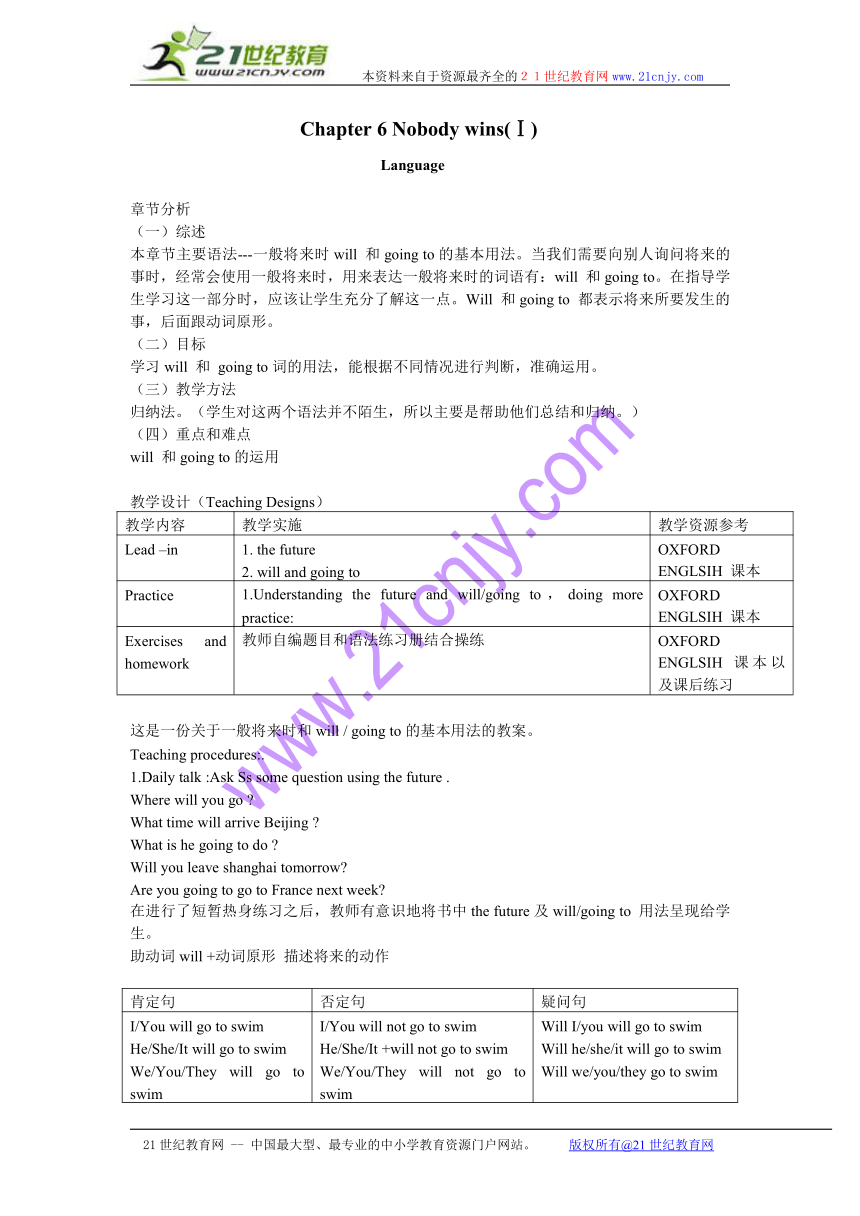英语:chapter 6 nobody wins(ⅰ)language教案(上海牛津八年级上)
文档属性
| 名称 | 英语:chapter 6 nobody wins(ⅰ)language教案(上海牛津八年级上) |  | |
| 格式 | rar | ||
| 文件大小 | 14.1KB | ||
| 资源类型 | 教案 | ||
| 版本资源 | 牛津上海版(试用本) | ||
| 科目 | 英语 | ||
| 更新时间 | 2010-01-18 20:39:00 | ||
图片预览

文档简介
本资料来自于资源最齐全的21世纪教育网www.21cnjy.com
Chapter 6 Nobody wins(Ⅰ)
Language
章节分析
(一)综述
本章节主要语法---一般将来时will 和going to的基本用法。当我们需要向别人询问将来的事时,经常会使用一般将来时,用来表达一般将来时的词语有:will 和going to。在指导学生学习这一部分时,应该让学生充分了解这一点。Will 和going to 都表示将来所要发生的事,后面跟动词原形。
(二)目标
学习will 和 going to词的用法,能根据不同情况进行判断,准确运用。
(三)教学方法
归纳法。(学生对这两个语法并不陌生,所以主要是帮助他们总结和归纳。)
(四)重点和难点
will 和going to的运用
教学设计(Teaching Designs)
教学内容 教学实施 教学资源参考
Lead –in 1. the future2. will and going to OXFORD ENGLSIH 课本
Practice 1.Understanding the future and will/going to,doing more practice: OXFORD ENGLSIH 课本
Exercises and homework 教师自编题目和语法练习册结合操练 OXFORD ENGLSIH 课本以及课后练习
这是一份关于一般将来时和will / going to的基本用法的教案。
Teaching procedures:.
1.Daily talk :Ask Ss some question using the future .
Where will you go
What time will arrive Beijing
What is he going to do
Will you leave shanghai tomorrow
Are you going to go to France next week
在进行了短暂热身练习之后,教师有意识地将书中the future及will/going to 用法呈现给学生。
助动词will +动词原形 描述将来的动作
肯定句 否定句 疑问句
I/You will go to swimHe/She/It will go to swimWe/You/They will go to swim I/You will not go to swimHe/She/It +will not go to swimWe/You/They will not go to swim Will I/you will go to swimWill he/she/it will go to swimWill we/you/they go to swim
Will 构成的一般将来时的肯定形式可缩略为I/you/she/he/it/we/they’ll:否定形式可缩略为I/you/she/he/it/we/they won’t
Will构成的一般将来时表示刚决定要做的事情。
Will构成的一般将来时可以表示“预见”。当表示预见未来的时候,经常和一些表示意见的词连用。
be 动词+going to+动词原形用来描述 将来要发生的动作或状态
肯定句 否定句 疑问句
I am going to walk You are going to walkHe/She/It is going to walkWe/You/They are going to walk I am not going to walk You are not going to walkHe/She/It is not going to walkWe/You/They are not going to walk Am I going to walk Are you going to walkIs he/she/it going to walkAre we/you/they are going to walk
此结构可缩略为:I’m going to, he/she/it’s going to, we /you /they’ are going to
用be going to 结构表示一般将来时主要用来描述将来将要发生的动作或状态,尤其是用来表示“意图”,即打算在最近的将来或将来要做的事情,也就是已经决定好,将来一定回发生的事情
用be going to 结构还可以表示“预见”,即现在有迹象表明将要发生或即将发生某种情况。
在使用一般将来时来描述将来的打算、动作或愿望时。常常用到各种表示“将来时间”的时间状语。
I’ll meet you Tomorrow(明天)the day after tomorrow(后天)next week(下周)soon(不久之后)this evening (今晚)in the evening (在晚上)in ten minutes (10分钟后)on Thursday(在星期四)at 3:30(在3点半)etc
这些时间不仅可以放在句末,也可以放在句首。
关于in、on和at与时间连用,作时间状语的搭配。值得注意的是,在today、yesterday 、tomorrow、the day before yesterday、the day after tomorrow、soon、last、next前不加in、on或at.
我们不可能总是对将来有把握。Might和could可用于表示没有把握。
We might go to Canada. It could snow soon.
下面这样的短语常常用来表示有把握或没有把握的情况:I’m sure, definitely, I expect I(don’t)think probably
I’m sure it’ll be all right. We’re definitely going to be at the meeting.
I except everyone will be going home. Rachel will probably be late.
I think I’m going to sneeze . I don’t think Tom’s coming tonight.
现在时表示将来时,表示安排
现在进行时用于表示某人已经安排了将来要做的事。
下面是一些例子:
I’m meeting Harriet at six o’clock.
David is coming round later on.
现在进行时还可用语表示正在发生的事。
现在:We’re having a party at the moment.
将来:We’re having a party tomorrow.
在上面两句中,时间短语表明我们指的是现在还是将来。
3. Understanding the grammar by more practice:
I.Fill in the blanks with the verbs in their proper forms
1.There____(be) a new cartoon this evening
2.The report says it _______(be) fine tomorrow.
3.Hurry up , or you ______miss the early bus
4.We _____(go) cycling tomorrow if it ____(be) fine tomorrow
5.I hope that you _____(come) to Shanghai next spring.
6.The workers _____(build) another bridge across the river the next year.
7.We _________(not ,go) fishing if it ____________(rain) tomorrow.
8.I________(go) to bed early tonight because I __________(start) early tomorrow morning.
21世纪教育网 -- 中国最大型、最专业的中小学教育资源门户网站。 版权所有@21世纪教育网
Chapter 6 Nobody wins(Ⅰ)
Language
章节分析
(一)综述
本章节主要语法---一般将来时will 和going to的基本用法。当我们需要向别人询问将来的事时,经常会使用一般将来时,用来表达一般将来时的词语有:will 和going to。在指导学生学习这一部分时,应该让学生充分了解这一点。Will 和going to 都表示将来所要发生的事,后面跟动词原形。
(二)目标
学习will 和 going to词的用法,能根据不同情况进行判断,准确运用。
(三)教学方法
归纳法。(学生对这两个语法并不陌生,所以主要是帮助他们总结和归纳。)
(四)重点和难点
will 和going to的运用
教学设计(Teaching Designs)
教学内容 教学实施 教学资源参考
Lead –in 1. the future2. will and going to OXFORD ENGLSIH 课本
Practice 1.Understanding the future and will/going to,doing more practice: OXFORD ENGLSIH 课本
Exercises and homework 教师自编题目和语法练习册结合操练 OXFORD ENGLSIH 课本以及课后练习
这是一份关于一般将来时和will / going to的基本用法的教案。
Teaching procedures:.
1.Daily talk :Ask Ss some question using the future .
Where will you go
What time will arrive Beijing
What is he going to do
Will you leave shanghai tomorrow
Are you going to go to France next week
在进行了短暂热身练习之后,教师有意识地将书中the future及will/going to 用法呈现给学生。
助动词will +动词原形 描述将来的动作
肯定句 否定句 疑问句
I/You will go to swimHe/She/It will go to swimWe/You/They will go to swim I/You will not go to swimHe/She/It +will not go to swimWe/You/They will not go to swim Will I/you will go to swimWill he/she/it will go to swimWill we/you/they go to swim
Will 构成的一般将来时的肯定形式可缩略为I/you/she/he/it/we/they’ll:否定形式可缩略为I/you/she/he/it/we/they won’t
Will构成的一般将来时表示刚决定要做的事情。
Will构成的一般将来时可以表示“预见”。当表示预见未来的时候,经常和一些表示意见的词连用。
be 动词+going to+动词原形用来描述 将来要发生的动作或状态
肯定句 否定句 疑问句
I am going to walk You are going to walkHe/She/It is going to walkWe/You/They are going to walk I am not going to walk You are not going to walkHe/She/It is not going to walkWe/You/They are not going to walk Am I going to walk Are you going to walkIs he/she/it going to walkAre we/you/they are going to walk
此结构可缩略为:I’m going to, he/she/it’s going to, we /you /they’ are going to
用be going to 结构表示一般将来时主要用来描述将来将要发生的动作或状态,尤其是用来表示“意图”,即打算在最近的将来或将来要做的事情,也就是已经决定好,将来一定回发生的事情
用be going to 结构还可以表示“预见”,即现在有迹象表明将要发生或即将发生某种情况。
在使用一般将来时来描述将来的打算、动作或愿望时。常常用到各种表示“将来时间”的时间状语。
I’ll meet you Tomorrow(明天)the day after tomorrow(后天)next week(下周)soon(不久之后)this evening (今晚)in the evening (在晚上)in ten minutes (10分钟后)on Thursday(在星期四)at 3:30(在3点半)etc
这些时间不仅可以放在句末,也可以放在句首。
关于in、on和at与时间连用,作时间状语的搭配。值得注意的是,在today、yesterday 、tomorrow、the day before yesterday、the day after tomorrow、soon、last、next前不加in、on或at.
我们不可能总是对将来有把握。Might和could可用于表示没有把握。
We might go to Canada. It could snow soon.
下面这样的短语常常用来表示有把握或没有把握的情况:I’m sure, definitely, I expect I(don’t)think probably
I’m sure it’ll be all right. We’re definitely going to be at the meeting.
I except everyone will be going home. Rachel will probably be late.
I think I’m going to sneeze . I don’t think Tom’s coming tonight.
现在时表示将来时,表示安排
现在进行时用于表示某人已经安排了将来要做的事。
下面是一些例子:
I’m meeting Harriet at six o’clock.
David is coming round later on.
现在进行时还可用语表示正在发生的事。
现在:We’re having a party at the moment.
将来:We’re having a party tomorrow.
在上面两句中,时间短语表明我们指的是现在还是将来。
3. Understanding the grammar by more practice:
I.Fill in the blanks with the verbs in their proper forms
1.There____(be) a new cartoon this evening
2.The report says it _______(be) fine tomorrow.
3.Hurry up , or you ______miss the early bus
4.We _____(go) cycling tomorrow if it ____(be) fine tomorrow
5.I hope that you _____(come) to Shanghai next spring.
6.The workers _____(build) another bridge across the river the next year.
7.We _________(not ,go) fishing if it ____________(rain) tomorrow.
8.I________(go) to bed early tonight because I __________(start) early tomorrow morning.
21世纪教育网 -- 中国最大型、最专业的中小学教育资源门户网站。 版权所有@21世纪教育网
